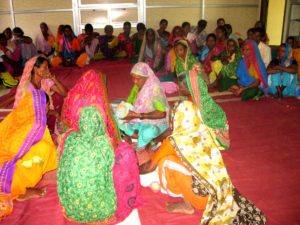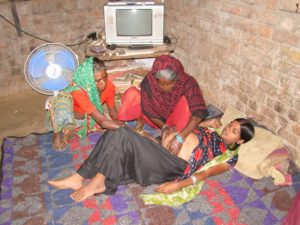I n the western Indian state of Gujarat, 160-170 mothers in 100,000 deliveries and 55 infants per 1000 live births will not survive. ARCH is working to alleviate such a staggering situation in the rural tribal areas of talukas Dharampur and Kaprada in southern Gujarat where poverty and remote geography create an especially risky birthing environment. In this area, almost 90 percent of deliveries were conducted by untrained traditional birth attendants (TBAs), called dais in unhygienic and unsafe ways. After over 25 years of experience in the field, we determined that one of the most effective strategies for alleviating maternal and infant mortality rates is training the local TBAs to conduct safe and hygienic deliveries and send all primis and at-risk women for hospital delivery. Since our TBA training program began in 2007, we have seen the percentage of institutional deliveries in our project villages rise to about 40 percent.
n the western Indian state of Gujarat, 160-170 mothers in 100,000 deliveries and 55 infants per 1000 live births will not survive. ARCH is working to alleviate such a staggering situation in the rural tribal areas of talukas Dharampur and Kaprada in southern Gujarat where poverty and remote geography create an especially risky birthing environment. In this area, almost 90 percent of deliveries were conducted by untrained traditional birth attendants (TBAs), called dais in unhygienic and unsafe ways. After over 25 years of experience in the field, we determined that one of the most effective strategies for alleviating maternal and infant mortality rates is training the local TBAs to conduct safe and hygienic deliveries and send all primis and at-risk women for hospital delivery. Since our TBA training program began in 2007, we have seen the percentage of institutional deliveries in our project villages rise to about 40 percent.
Training

ARCH started its TBA training program in Vavar and Mamabhacha villages in 2007-08. We now work in 25 villages with a combined population of approximately 20,000. From these 25 villages, a total of about 50 TBAs were selected and have been continuously training with ARCH since then. We have also trained 30 TBAs in partnership with the State Government’s Mankuniya Project, as well as 150 TBAs through other NGOs.
The training of TBAs is often a challenge, given that the TBAs speak Kokani, and do not understand our spoken language, Gujarati. They are completely uneducated and illiterate, so their scientific understanding is very limited. Moreover, they cannot concentrate for more than a few minutes, and many are elderly. Thus, our training relies heavily on audio-visual aides, models and interactive methods such as dramas and songs. We have staff fluent in the tribal dialect to communicate with the TBAs. Despite these challenges, the TBAs play an important role in community health because they are trusted by the rural community and they have years of traditional delivery experience.
The initial training lasts for a total of 10 days, 2 days a month for 5 months. At the end, we provide each TBA with a Dai Peti, which contains materials needed for safe and hygienic delivery: Mackintosh Kangroo Joli, bowl, savlon bottle, soap, new razor blade, sterilized thread, cotton gauze, etc.
After the training, we keep in contact with the TBAs through monitoring and refresher trainings. Each TBA comes to ARCH regularly every three months for one day for additional trainings. On these days, they report to supervisors about their delivery experiences and give us feedback about difficult deliveries and complications they sent to hospitals.
Dai Exposure
We have twice conducted a Dai Mela where 250 TBAs of Dharampur and Kaprada attended. TBAs of ARCH and other NGOs participated in this mela. At the mela, we prepared an exhibition about pregnancy, delivery, and post-delivery care and interesting case studies of complicated cases for discussion.
We have recently begun taking the TBAs on field trips to expose them to modern medical facilities such as the State Hospital in Dharampur. We also aim to build rapport with the women and show them other places of interest such as the District Science Center and Tithal beach.
